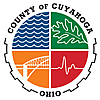Carl Stokes: A Ground-Breaking Political Figure
 Carl B. Stokes had a transformational impact on the City of Cleveland and the entire country, becoming the first Black mayor of a major U.S. city in 1967. We’re taking a look at his legacy through artifacts found at the Cuyahoga County Archives.
Carl B. Stokes had a transformational impact on the City of Cleveland and the entire country, becoming the first Black mayor of a major U.S. city in 1967. We’re taking a look at his legacy through artifacts found at the Cuyahoga County Archives.
Carl Stokes was born in Cleveland, and raised by his mother in Cleveland’s first federally funded housing project for the poor, Outhwaite. Stokes was a good student but dropped out of high school in 1944 and worked at Thompson Products before joining the U.S. Army at 18 years old. Stokes returned to Cleveland after his discharge in 1946 and earned his high school diploma the following year. He earned his bachelor’s degree from the University of Minnesota in 1954 and graduated from Cleveland-Marshall Law School in 1956.
His political career began less than a decade later. Stokes was the first Black Democrat elected to the Ohio House of Representatives in 1962, and served three terms. He narrowly lost a bid for Mayor of Cleveland in 1965, but this was not a sign of what was to come.
Stokes based his chances for election as mayor on his ability to secure the vote of the 128,000 Black voters out of the nearly 338,000 registered votes in the city, along with a portion of the white vote. Once he realized that solely the Black vote would not guarantee a win, he started campaigning on Cleveland’s West Side. He told residents that just because a Black mayor was elected wouldn’t mean there would be a “takeover”. He cited Italian, Slovenian and Irish mayors and said that his election would just mean that the mayor could be coming from another one of Cleveland’s many ethnic groups.
 |
| Carl Stokes’ name on the 1950 Ward 12 Precinct A Register of Voters list |
The primary election showed that Stokes received a majority of the votes in 13 wards, all of which were predominantly Black. He got 90% of the Black vote and demonstrated that African Americans were an impactful political force in the community.
Two years after his first attempt, Stokes entered the primary as a Democrat against Mayor Ralph S. Locher. Stokes was endorsed by the Plain Dealer and defeated Locher by 18,000 votes. He later defeated Seth Taft, the grandson of former U.S. President William Howard Taft, and became the first Black mayor of a major metropolitan city. This election brought 79% of those eligible to vote out to the polls, the largest percentage of voters to turn out for a municipal election in 30 years. He was reelected in 1969.
Stokes served as Mayor of Cleveland for two terms. During that time, he opened city hall jobs to Black people and women and created various urban revitalization programs to combat serious housing problems as well as water and air pollution.
After his transformative tenure as mayor, Stokes lectured across the United States and later became the first black anchorman in New York City in 1972. When he returned to Cleveland in 1980, he served as legal counsel for the United Auto Works union. From 1983 to 1994, he served as Cleveland municipal judge.
He was later appointed as U.S. Ambassador to the Republic of Seychelles by President Bill Clinton. He was awarded 12 honorary degrees and numerous civic awards for this work.
While serving as Ambassador, Stokes was diagnosed with cancer of the esophagus and returned to Cleveland, where he died in 1996.
Carl Stokes will forever be known as the ground-breaking Cleveland Mayor and a symbol of a changing America.
Records that helped tell this story include “Black Americans in Cleveland” by Russell H. Davis; “Ballots and Bullets: Black Power Politics and Urban Guerrilla Warfare in 1968 Cleveland” by James Robenalt; and Case Western Reserve University’s Encyclopedia of Cleveland History.
 An official website of the Cuyahoga County government. Here’s how you know
An official website of the Cuyahoga County government. Here’s how you know



